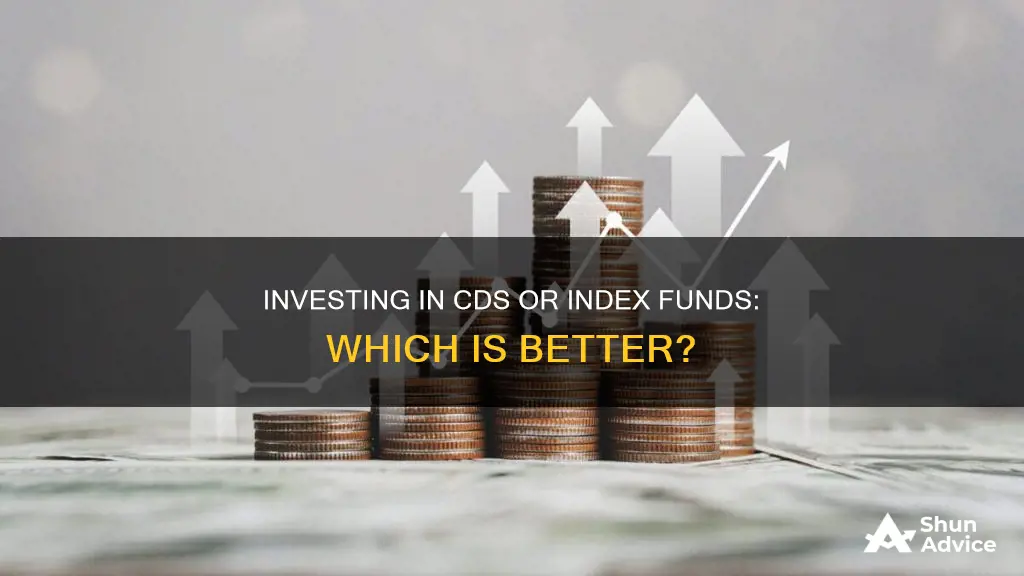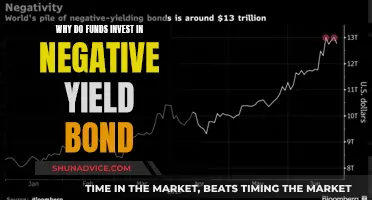
Whether you should invest in a certificate of deposit (CD) or index funds depends on your financial goals and risk tolerance. CDs are insured deposit accounts that offer a fixed interest rate over a specified period, generally ranging from a few months to five years. On the other hand, index funds are a type of mutual fund that invests in a diversified portfolio of securities, such as stocks and bonds, to track a particular market index. While CDs offer guaranteed but modest returns with minimal risk, index funds have higher growth potential but carry greater risk as you can lose some or all of your initial investment.
| Characteristics | Values |
|---|---|
| Risk | CDs are safer and have a guaranteed return. Index funds are riskier but have higher returns. |
| Returns | CDs have low to moderate returns. Index funds have higher returns. |
| Time horizon | CDs are better for short-term goals. Index funds are better for long-term goals. |
| Liquidity | CDs have lower liquidity. Index funds have higher liquidity. |
| Flexibility | CDs are less flexible. Index funds are more flexible. |
| Fees | CDs have no fees. Index funds have fees. |
What You'll Learn

Liquidity and flexibility
CDs, or certificates of deposit, are known for their low risk and stable returns. However, they often come with early withdrawal penalties, making them an inflexible investment option. If you withdraw your money from a CD before the maturity date, you will likely incur a penalty that can erase your gains or even result in a loss. This lack of flexibility can be a significant drawback, especially if you need access to your funds in an emergency.
On the other hand, index funds, such as mutual funds, offer greater flexibility. You can generally buy and sell shares in mutual funds as often as you like, providing liquidity that CDs cannot match. While you may have to pay a fee for buying or selling mutual fund shares, it is usually less than the penalties associated with early withdrawals from CDs. This flexibility can be crucial if you need to access your money unexpectedly.
However, it is important to remember that mutual funds can fluctuate in value, and there is a chance of losing money as well as making gains. In contrast, CDs provide a guaranteed return, assuming you don't withdraw your money early.
When considering liquidity and flexibility, index funds offer more flexibility in terms of buying and selling shares. However, CDs may be more liquid in certain situations, such as when you need to access your funds in an emergency and are willing to pay the early withdrawal penalty. Ultimately, both investment options have their advantages and disadvantages regarding liquidity and flexibility, and the best choice depends on your individual needs and preferences.
Mutual Fund Shares: Smart Investment or Risky Business?
You may want to see also

Inflation risk
When deciding whether to invest in a CD or index funds, inflation risk is an important factor to consider. Inflation risk refers to the possibility that the return on an investment will not keep up with the rate of inflation, resulting in a loss of purchasing power over time.
Certificates of deposit (CDs) offer a fixed interest rate for a specific duration, typically ranging from three months to five or more years. During periods of rising inflation, CDs may not be the best investment option as they lock in your money at a fixed rate. If the interest rate on a CD cannot keep up with inflation, your money loses purchasing power. This is especially true for longer-term CDs, as your money is tied up for a longer period, potentially missing out on better-paying investments.
To mitigate inflation risk, some CDs offer adjustable rates. Variable-rate CDs and bump-up CDs can adjust their interest rates upward, making them more suitable during periods of rising inflation and interest rates. However, these products tend to offer lower initial interest rates compared to traditional CDs.
Index funds, on the other hand, can provide some protection against inflation. By investing in a diversified portfolio of stocks or bonds, index funds have the potential to generate returns that outpace inflation. Historically, the stock market has delivered higher returns over the long term compared to CDs, helping to preserve and increase purchasing power.
Additionally, certain types of index funds are specifically designed to protect against inflation. For example, Treasury Inflation-Protected Securities (TIPS) are indexed to inflation and guarantee a return higher than the inflation rate. This ensures that the principal value of TIPS increases with inflation, providing a real return to investors.
In summary, when considering inflation risk, index funds generally offer better protection compared to CDs. CDs with fixed rates may struggle to keep up with rising inflation, while adjustable-rate CDs may provide some inflation protection but at the cost of lower initial returns. Index funds, particularly those focused on inflation-hedged asset classes, have a better track record of preserving and growing purchasing power over time.
Mutual Fund Investment Guide for Beginners in Nepal
You may want to see also

Investment timeline
When deciding how to invest your money, it's important to consider your investment timeline. This is because different investments are better suited to different time horizons.
CDs are generally considered a short-term investment strategy, typically ranging from six months to five years. During this time, your money is locked away and you cannot access it without incurring a penalty. This makes CDs a good option if you are saving for a specific short-term financial goal, such as a down payment on a car, and want to avoid any risk of losing your principal.
On the other hand, mutual funds are typically considered a long-term investment strategy. Mutual funds do not have a maturity date, and you can keep your money invested for as long as you like. This makes them suitable for long-term goals like retirement, where you have decades to ride out any fluctuations in the market.
It's worth noting that the longer you invest in a CD, the higher the interest rate you will generally receive. However, this also increases the risk of inflation heating up and reducing the purchasing power of your money.
So, if you are investing for the long term, mutual funds or index funds are likely a better option as they have the potential for higher returns. If you are investing for the short term, CDs may be a better choice to protect your principal and provide guaranteed returns.
Bond Index Funds: A Smart, Diversified Investment Strategy
You may want to see also

Risk tolerance
When it comes to risk tolerance, CDs are generally suitable for those with a low-risk appetite. They are ideal for short- to medium-term financial goals, such as saving for a down payment on a car or a home. Additionally, CDs are a good option if you have spare cash that you won't need for a few years or if you are a very risk-averse investor who wants to avoid the volatility of the financial markets.
Index funds, on the other hand, are better suited for investors with a higher risk tolerance and a longer time horizon. While there is a potential for significant losses, the stock market has historically bounced back over time. Index funds are a popular choice for retirement investing as they offer higher growth potential over the long term.
It's important to note that risk tolerance is a personal assessment, and it's crucial to understand your own risk tolerance before making any investment decisions. Factors such as your financial goals, time horizon, and comfort with market volatility will play a role in determining whether CDs or index funds align better with your risk tolerance.
Islamic Mutual Funds: Halal Investing for Muslims
You may want to see also

Returns and growth potential
CDs offer guaranteed, modest returns with very low risk. The longer the term, the higher the interest paid. For instance, CDs with one-year terms currently have the strongest returns, with some offering rates above 5%. However, CDs have low flexibility as funds are locked for the term, and early withdrawal incurs penalties. They are best suited for short-term financial goals, such as saving for a down payment on a car, and for risk-averse investors.
Index funds, on the other hand, have historically delivered solid returns over the long term. They provide a diversified approach to investing and aim to minimize the risk of losses. However, they are subject to market fluctuations and carry the risk of losing the principal investment. Index funds are suitable for long-term investors with a higher risk tolerance who can wait out price fluctuations.
Both investment options have their advantages and disadvantages in terms of returns and growth potential. CDs offer guaranteed, modest returns with low risk and flexibility, while index funds offer the potential for higher returns over the long term but carry greater risk. Ultimately, the decision depends on the investor's financial goals, risk tolerance, and investment horizon.
RIA Mutual Fund Investment: What's the Catch?
You may want to see also
Frequently asked questions
CDs, or certificates of deposit, are insured deposit accounts that offer a fixed interest rate over a specified period of time. They are a safe place for savings you don't want to put at risk. CDs are also good for building up a fund for a short-term goal, like a down payment on a car.
Index funds provide a diversified approach to investing and have historically delivered solid returns over the long term. They are better for building wealth over the long term. If you want to save for retirement, index funds will be the best pick.
CDs have very low risks but also very low returns. They are inflexible investment vehicles and your money isn't liquid. Index funds, on the other hand, carry the risk of losing some or all of your initial investment.







